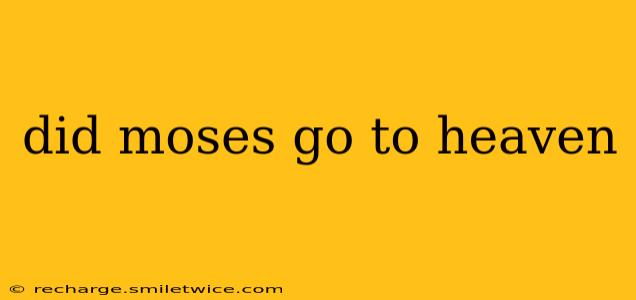The question of whether Moses went to heaven is a complex one, deeply rooted in theological interpretations and differing beliefs about the afterlife. There's no explicit biblical passage stating definitively whether Moses ascended to heaven. The ambiguity surrounding his death and ultimate fate has fueled centuries of debate and diverse theological perspectives.
What Does the Bible Say About Moses' Death?
Deuteronomy 34:5-6 offers the only biblical account of Moses' death: "So Moses, the servant of the Lord, died there in the land of Moab, as the Lord had said. And the Lord buried him in the valley in the land of Moab, opposite Beth-peor; but no one knows his burial place to this day." Noticeably absent is any mention of a heavenly ascension or divine reward beyond burial. This lack of detail has sparked considerable interpretation.
Did Moses Die and Go to Sheol/Hades?
Many interpretations suggest that Moses, like all humans before the resurrection of Jesus, went to Sheol (the Hebrew term) or Hades (the Greek equivalent). These terms often represent a general place of the dead, not necessarily a place of eternal torment or reward. This understanding aligns with the Old Testament's understanding of the afterlife—a shadowy realm awaiting final judgment.
What About the Transfiguration?
Some point to the Transfiguration account in Matthew 17, where Moses appears alongside Elijah conversing with Jesus. However, this appearance is a visionary event, a divinely orchestrated moment of revelation, not necessarily a reflection of Moses' post-death state. It demonstrates his importance and spiritual significance, not his heavenly abode.
Did Moses Experience a Bodily Resurrection?
The concept of a bodily resurrection wasn't fully realized until the New Testament, with the resurrection of Jesus. While some interpretations posit that Moses experienced a type of resurrection, a bodily ascension isn't explicitly stated in scripture. Such interpretations often rely on theological extrapolations rather than direct biblical evidence.
Different Theological Perspectives
Different theological viewpoints address Moses' afterlife differently.
- Traditional Jewish perspectives: These generally focus on the concept of Olam Ha-Ba (the World to Come), a future state of existence less clearly defined as a specific heaven or hell. Moses' fate is seen within this larger context of collective resurrection and divine judgment.
- Christian perspectives: Varying views exist within Christianity. Some align with the Old Testament understanding of Sheol, while others, emphasizing Jesus' resurrection, believe Moses' faith ensured him a place in heaven. However, this is primarily based on faith and theological extrapolation, not direct scripture.
Conclusion: The Mystery Remains
Ultimately, the Bible doesn't provide a definitive answer to whether Moses went to heaven. The ambiguity surrounding his death allows for varied interpretations based on individual theological perspectives and understandings of the afterlife. The lack of specific detail should encourage thoughtful reflection rather than definitive pronouncements. The mystery surrounding Moses' ultimate fate emphasizes the profound questions about death, afterlife, and God's judgment that have resonated through millennia.
